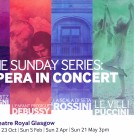Villi 2017Scottish Opera
Read more about the opera Villi
The final work in a thoroughly enjoyable season was Scottish Opera's concert performance of Le villi. Puccini's first opera contains some good red meat in its writing for soloists, chorus and orchestra. It is a very short work, and important bits of the drama are simply missing. But the packed audience clearly found it easy to understand what had persuaded his superiors to encourage the young man.
Scottish Opera's 2016/17 mainstage season opened with a revival of Sir Thomas Allen's excellent production of The Marriage of Figaro, first mounted in 2010. The new stagings included Pelléas et Mélisande, which the company has not mounted in forty years. There was the company's first Philip Glass production, his adaptation of Kafka's The Trial. Duke Bluebeard's Castle appeared in tandem with Lliam Paterson's new piece The 8th Door. A new staging of La bohème ends the season. The medium scale work, touring smaller venues in the autumn, was a delightfully quirky new treatment of The Elixir of Love.
For several seasons, Scottish Opera have presented a series of concerts on a Sunday afternoon, using the company's orchestra and chorus. Usually the programmes have been symphonic, though there has recently been a move towards the more appropriate format of employing a star singer in a series of extracts and arias, as well as non-operatic songs.
For the season 2016-17, the company adopted a far more enterprising policy - the use of one-off concert performances to introduce to Scottish audiences works that are scarcely known in these parts. The season kicked off with the second of Mascagni's operas to be produced, L'amico Fritz, a piece that could hardly be more of a contrast to its hot-blooded and tragic predecessor, Cavalleria Rusticana.
The other three included Debussy's early cantata L'enfant prodigue, which was eventually staged shortly before World War One. Rossini was represented by his delightful early farce The Silken Ladder, known for its famous overture. This is the only one of the four the company had tackled previously, though it was a long time ago.
The final work is a genuine rarity, timed to accompany the new staging of La bohème. Puccini's first opera, Le villi, has not been heard in Scotland before. It was preceded by three of the composer's early orchestral pieces, the Preludio Sinfonico, Crisantemi and Capriccio Sinfonico. The Prelude was a fascinating piece, partly because, though packed with melody, it doesn't actually sound like Puccini - at eighteen the personal fingerprints had not taken root. It actually sounded as though it could almost be by his teacher Ponchielli - who was still just alive at the time. An excellent model, anyway. The brief elegy for string quartet Crisantemi, sounded beautifully poised as played by the string section, directed by leader Anthony Moffat. The third of these fascinating snippets was more obviously Puccinian, not just because of the central section later recycled into La bohème. All three pieces were beautifully presented by the orchestra under Stuart Stratford - they were on cracking form.
Hearing a piece like Le villi live is a strange experience. There is some superb music in it, and the three soloists all grabbed their opportunities gratefully. The chorus has plenty to do, and also sang superbly. The dance music was taken at a fizzing pace, whether the celebratory party music at the start or the Willis (almost like the gleeful witches in Verdi's Macbeth) at the end.
As a musical drama, it was all very odd. Ballet fans couldn't fail to make comparisons with Giselle - Roberto here finding Anna to be rather less forgiving than Albrecht finds Giselle. Puccini's dance music is much fiercer and, of course, briefer, than Adam's, and the chorus writing is effective at this climax. The big gap in the music drama is the absence of a middle act in which we would see Roberto's fateful encounter with the witch. Parallels with the scene with Venus at the start of Wagner's Tannhäuser must have discouraged any attempt to emulate the writing of what was Wagner's most popular opera at the time, especially when many composers were trying to purge his influence. Replacing this section with two brief narrations (vividly declaimed by Patrizia Dina, the company's language coach), was a fascinating device, which, along with a charming orchestral lament, made a fascinatingly novel idea, without convincing that it was working.
For the three sung roles of father, daughter and deserting lover, the company presented a strong team. Stephen Gadd did enough in a slightly underwritten part to make us wish for more drama there. As a vengeful father he was only allowed a very brief outburst, well as he did it. Peter Auty is also a familiar figure, and he seized happily on the cracking scene he had on his return. He also duetted beautifully with Anna. The heroine was sung by a new name in these parts, an American soprano, Karen Slack, who already has experience of working at the New York Met, Chicago and San Francisco. She had a beautiful voice, evenly produced and velvety in tone. Her entrance aria, 'Se come voi piccinna', perhaps the only piece to have had sporadic independent life, immediately showed the quality.
In all, this was a highly successful enterprise, a fascinating programme that was well planned and extremely well executed by all participants. It whets the appetite for a contrasting batch of Russian rarities next season.

